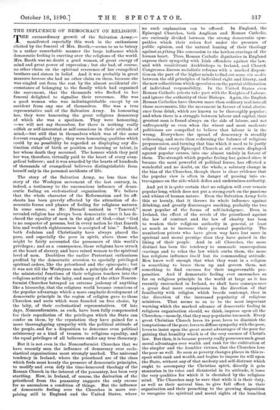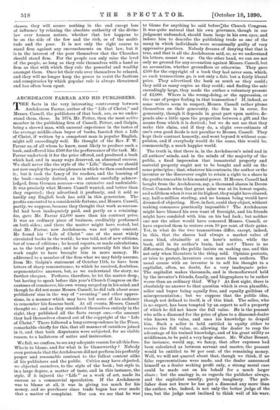THE INFLUENCE OF DEMOCRACY ON RELIGION.
THE extraordinary growth of the Salvation Army,— manifested especially this week in the enthusiasm elicited by the funeral of Mrs. Booth,—seems to us to betray in a rather remarkable manner the large influence which democratic feeling is exerting over the religions of the world. Mrs. Booth was no doubt a good woman, of great energy of mind and great power of expression ; but she bad, of course, no other claim on the spiritual reverence of her evangelical brothers and sisters in belief. And it was probably in great measure because she bad no other claim on them, because she was singled out from the rest by the almost accidental cir- cumstance of belonging to the family which had organised the movement, that the thousands who flocked to her funeral delighted to signalise their reverence. She was a good woman who was indistinguishable except by an accident from any one of themselves. She was a true representative unit of the Salvation Army. In honouring her, they were honouring the great religious democracy of which she was a specimen. They were honouring, —we will not say themselves, for there is nothing really selfish or self-interested or self-conscious in their attitude of mind,—but still that in themselves which was of the same fervent evangelical type ; they were honouring qualities which could by no possibility be regarded as displaying any dis- tinction either of birth or position or learning or talent, in her whose death they mourned. The honour which they paid her was, therefore, virtually paid to the heart of every evan- gelical believer; and it was awarded by the hearts of hundreds of thousands of evangelical believers distinguishable from herself only in the personal accidents of life.
The story of the Salvation Army, no less than the story of the Wesleyan movement of the last century, is, indeed, a testimony to the unconscious influence of demo- cratic feeling on ecclesiastical organisation. We believe that the whole character of the Reformation and its off- shoots has been gravely affected by the attraction of de- mocratic forms and phases of feeling for religious natures. In some sense, as Mr. Disraeli noticed in " Tancred," revealed religion has always been democratic since it has de- clared the equality of men in the sight of God,—that "God is no respecter of persons, but in every nation he that feareth him and worketh righteousness is accepted of him." Indeed, both Judaism and Christianity have always placed the poor, and especially the poor in spirit, above those who might be fairly accounted the possessors of this world's privileges ; and as a consequence, these religions have struck at the heart of slavery, and have raised women to the spiritual level of men. Doubtless the earlier Protestant enthusiasm profited by the democratic aversion to specially privileged spiritual orders, like the priesthood and the episcopate ; but it was not till the Wesleyans made a principle of shading off the ministerial functions of their religions teachers into the religions activity of the laity, and many of the other Noncon- formist Churches betrayed an extreme jealousy of anything like a hierarchy, that the religious world became conscious of the popular advantage which a more emphatic development of democratic principle in the region of religion gave to those Churches and sects which were founded on free choice, by the laity, of their ecclesiastical representatives. Of late days, Nonconformists, as such, have been fully compensated for their repudiation of the privileges which the State can confer on them, by the reputation they have gained for a more thoroughgoing sympathy with the political attitude of the people, and for a disposition to denounce even political aristocracy as a kind of treason to religions equality, and the equal privileges of all believers under any true theocracy.
But it is not even in the Nonconformist Churches that we have recently seen the influence of democracy over eccle- siastical organisations most strongly marked. The universal tendency in Ireland, where the priesthood are of the class which feels most keenly the pressure of democratic principles, to modify and even defy the time-honoured theology of the Roman Church in the interest of the peasantry, has been very startling. Now, in Ireland, of course, the derivation of the priesthood from the peasantry suggests the only excuse for so anomalous a condition of things. But the influence of democratic feeling over the Churches is more sur- prising still in England and the United States, where
no such explanation can be offered. In England, the Episcopal Churches, both Anglican and Roman Catholic, are curiously divided between the strong democratic sym- pathies which their rulers feel under the pressure of public opinion, and the natural leaning of their theology against anything like concession to the lawless cravings of the human heart. Thus, Roman Catholic dignitaries in England express their sympathy with Irish offenders against the law, and with recalcitrant Archbishops in Ireland, and Church Congresses discuss socialistic reforms with a marked disposi- tion on the part of the higher minds to find out some via media between the old principles of individual right and liberty, and the new collectivism which speculates on the partial obliteration of individual responsibility. In the United States even Roman Catholic priests take part with the Knights of Labour, and ignore the authority of their Bishops. Again, the English Roman Catholics have thrown more than ordinary zeal into all those movements, like the movement in favour of total abstin- ence from drink, which are known to be thoroughly popular ; and when there is a struggle between labour and capital, their greatest man is found always on the side of labour, and not unfrequently so even when the wisest and most moderate politicians are compelled to believe that labour is in the wrong. Everywhere the spread of democracy is steadily redressing, and more than redressing the balance of religions prepossession, and turning that bias which it used to be justly alleged that every Episcopal Church at all events displayed against popular causes, into one almost unduly in favour of them. The strength which popular feeling has gained since it became the most powerful of political forces, has effected a wonderful and no doubt, on the whole, a salutary change in the bias of the Churches, though there is clear evidence that the popular view is often in danger of passing into ex- travagance on the side which defies and undermines authority.
And yet it is quite certain that no religion will ever remain popular long, which does not put a strong curb on the passions and whims of human nature. Even the Salvation Army feels this so keenly, that it throws its whole influence against drinking, and greatly discourages smoking, probably the two most popular of the forms of self-indulgence. Even in Ireland, the effect of the revolt of the priesthood against the law of contract and the law of charity has been to weaken their religions authority in general, at least as much as to increase their personal popularity. The numberless priests who have given way have lost more in spiritual and moral prestige than they have gained in the liking of their people. And in all Churches, the more distinct has been the tendency to unmuzzle unscrupulous cravings and to relax the law which curbs them, the more has religions influence itself lost its commanding attitude. Men know well enough that what they want in a religion is something to brace them up and govern them, not something to find excuses for their ungovernable pro- pensities. And if democratic feeling ever encroaches so far on religious principle in the world at large as it has recently encroached in Ireland, we shall have consequences a great deal more conspicuous in the direction of that familiarity with religion which breeds contempt, than in the direction of the increased popularity of religious ministers. That seems to us to be the most important warning which the marked advance of democratic feeling in religious organisation should, we think, impress upon all the Churches,—namely, that they may popularise too much. Every great Christian Church loves its poor, loves to diminish the temptations of the poor, loves to diffuse sympathy with the poor, loves to insist upon the great moral advantages of the poor for gaining that humility which is of the very essence of Christ's law. But then, it is because poverty really possesses such great moral advantages over wealth and rank for the cultivation of the simpler and the humbler virtues, that the Churches loge the poor so well. So soon as poverty changes places in this re- spect with rank and wealth, and begins to impose its will upon the State, without any of that modesty and self-distrust which ought to accompany the Christian spirit, directly it gets stentorian in its voice and dictatorial in its attitude, it loses the very qualities for which it is cherished by the religious mind. The Churches may be sure that while it is their duty, as well as their natural bias, to give full effect in their organisation and their preaching to the growing disposition to recognise the spiritual and moral rights of the humblest classes, they will secure nothing in the end except loss of influence by relaTing the absolute authority of the divine law over human nature, whether that law happens to be on the side of the few and the rich, or of the multi- tude and the poor. It is not only the right course to stand firm against any encroachments on that law, but it is in the interest of the poor themselves that the Churches should stand firm. For the people can only raise the level of the people, so long as they rule themselves with a hand as firm as that with which they rule the powerful and wealthy amongst them. Once let their rule over themselves be relaxed, and they will no longer keep the power to resist the factions and conspiracies by which popular rule is always threatened and has often been upset.







































 Previous page
Previous page